Memories of Croatia in 1996: Reflections of a 5-Year-Old
August 11, 2022 - Memories of Croatia in 1996, as remembered by a 5-year-old visiting for the first time from America.
I was recently interviewed by someone in the United States working on a research project with Croatians and Croatian-Americans about the relationships between tourists and locals in Croatia. As a Croatian-American and someone who has lived in Croatia for seven years, I was a good fit.
The wonderful hour-long Zoom call took me on a journey through my Croatian adventures, from the Croatian influence in my family growing up in San Diego to my first visit to Croatia in 1996 and every visit after that until I moved here in 2015.
And it got me thinking a lot about my first trip to Croatia in 1996. I was 5 years old.
My family and I flew into Germany and drove from Frankfurt to Croatia, passing through German and Austrian towns along the way before reaching Zagreb. Which I remember vividly.
As Croatia smelled fresh of war, I remember being unable to sleep that first night in our Zagreb hotel, thinking there was a soldier in the closet. It was a haunting experience for a 5-year-old, and I can paint the interiors of that hotel room in my mind now.
I remember playing with pigeons in Ban Jelacic Square, which is something I recall every time I visit the capital now. If only I were as fearless of pigeons as I was back then...
We drove from Zagreb to Rijeka to visit my grandmother's sister and her family before taking the overnight ferry down to Split (remember when that still operated?).
Oddly enough, we chose not to spend much time in Split, even though it is the city where my father was born and where my grandfather and grandmother raised their family before moving to New York City in 1958. I do, however, have this photo of my brother and me at the ferry port. How those Jadrolinija ships have hardly changed in the last 26 years.
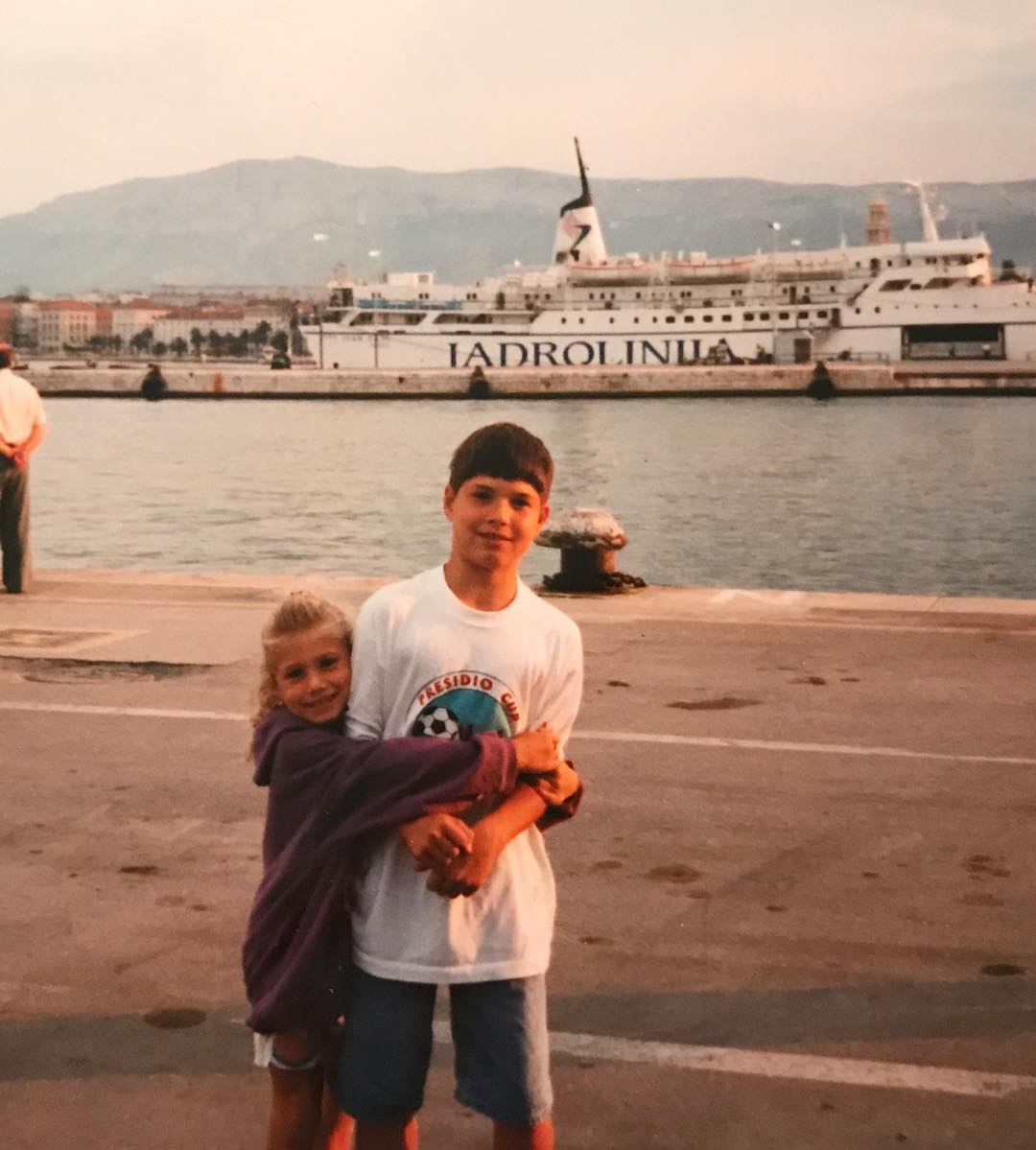
We made our way to Trogir, the town where my grandparents met in their teenage years. My grandfather's family roots are in Trogir, well, technically from a small village in the hills above Trogir called Prapatinica. His family ultimately migrated from the selo to the 'city'. My grandmother's family moved to Trogir from Stari Grad after World War II, which is where one of her brothers continued to live when we visited in 1996. I will never forget eating pršut and sir amongst the chickens in his small outdoor shack.
The memories I can recall most from that trip are with my mother's family in a tiny village outside of Metkovic called 'Kosa'. The seven-house village sits on the river, with two surnames ruling the territory. We are all somehow related.
We stayed at my mother's family home - where my dida and baba raised my mother and her 6 siblings. My mother hadn't seen her family in over a decade, though this absence carried more significance, considering her younger brothers had just fought in the Homeland War. My brother and I spent a lot of time dressing up in their uniforms.
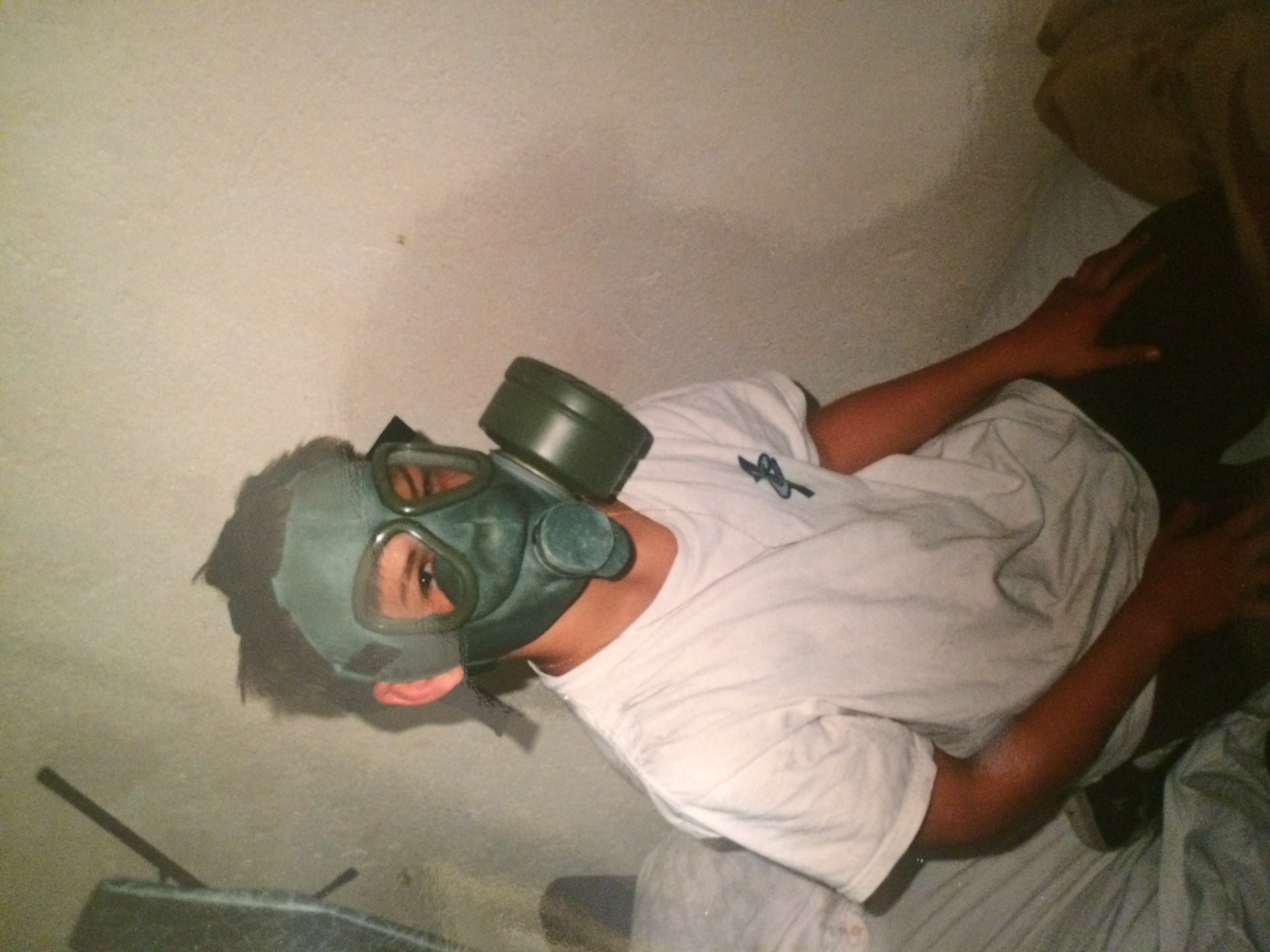
I have home videos of me chewing on crusty white bread, spread with butter and šipak marmalade, as that was my go-to breakfast in Croatia that summer (the sugary cereals of America were quickly forgotten). The few words in Croatian I knew then were endlessly repeated, from 'neću' to 'šta?' and 'jedan, dva triiiii!'.
I remember playing with the other village children on the river, setting out on our small trupina boat to reach the farmland across the way, where my family cultivated their crops to make a living. And the goats - I remember the many baby goats! If only I knew what their fate would be then...
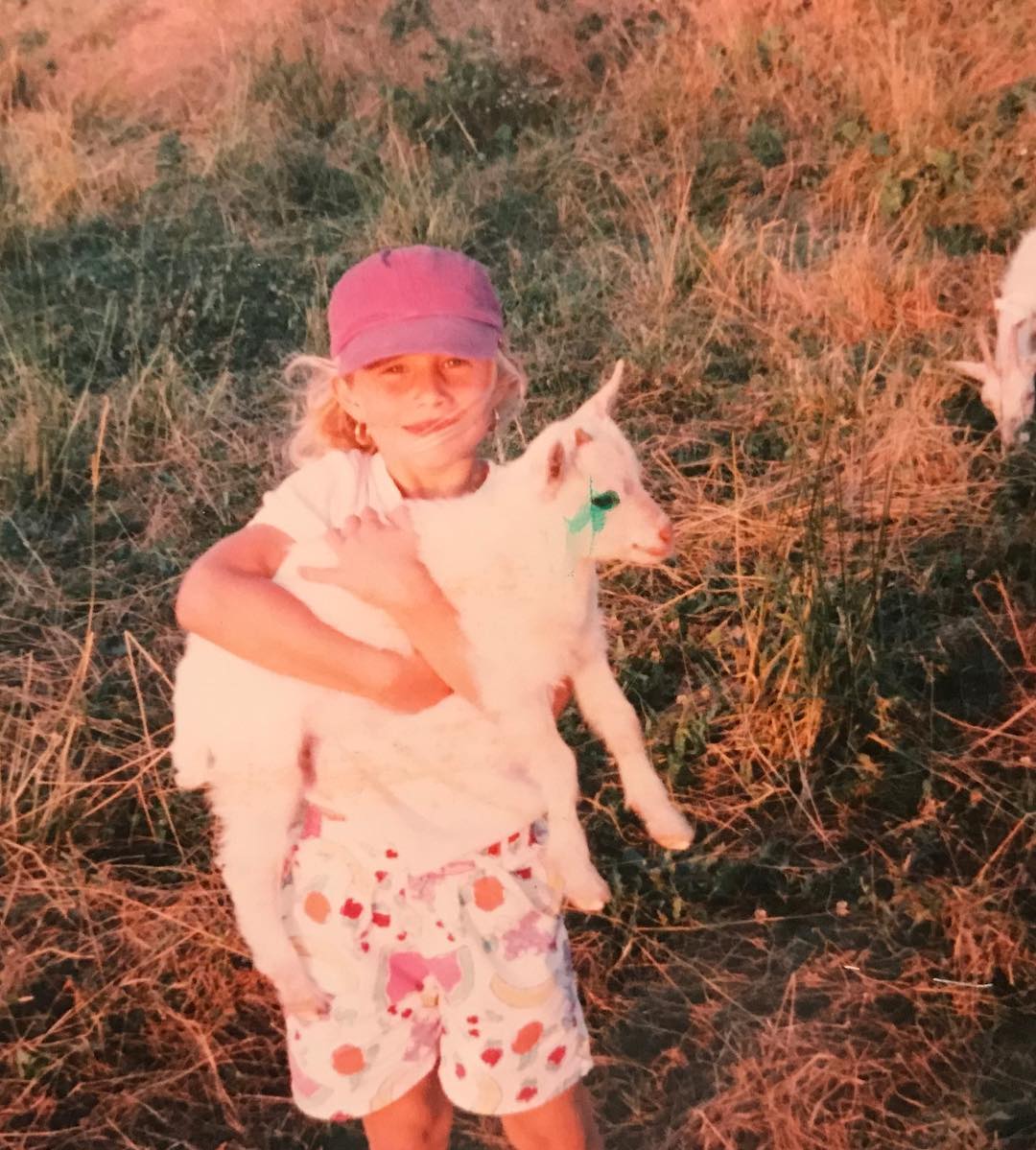
Being from the Neretva River and all, frogs are the ultimate delicacy. And my uncles were experts at hunting them - a unique craft that is done explicitly in the early morning hours. Now, anyone that knows a bit about frog culture in Dalmatia, is that it is usually eaten two ways - in a brudet (and in Neretva, this means stewed with river eel, too), or fried - you now, breaded like schnitzel or fried chicken.
I remember 15 of us huddled around the small family dinner table eating, what I thought, was fried chicken. And as any 5-year-old from America might do, dipping it in ketchup to imitate chicken fingers. I grew suspicious after I glanced over at my father eating the same thing, considering he had been a pescatarian since his early 20s. "Hmm.. If Tata is eating it, it can't be chicken."
And thus, my first experience eating frogs was had, with ketchup, at 5 years old.
I remember swimming at Klek beach, now just a short drive from the new Peljesac Bridge, which is where this famous photo was taken.
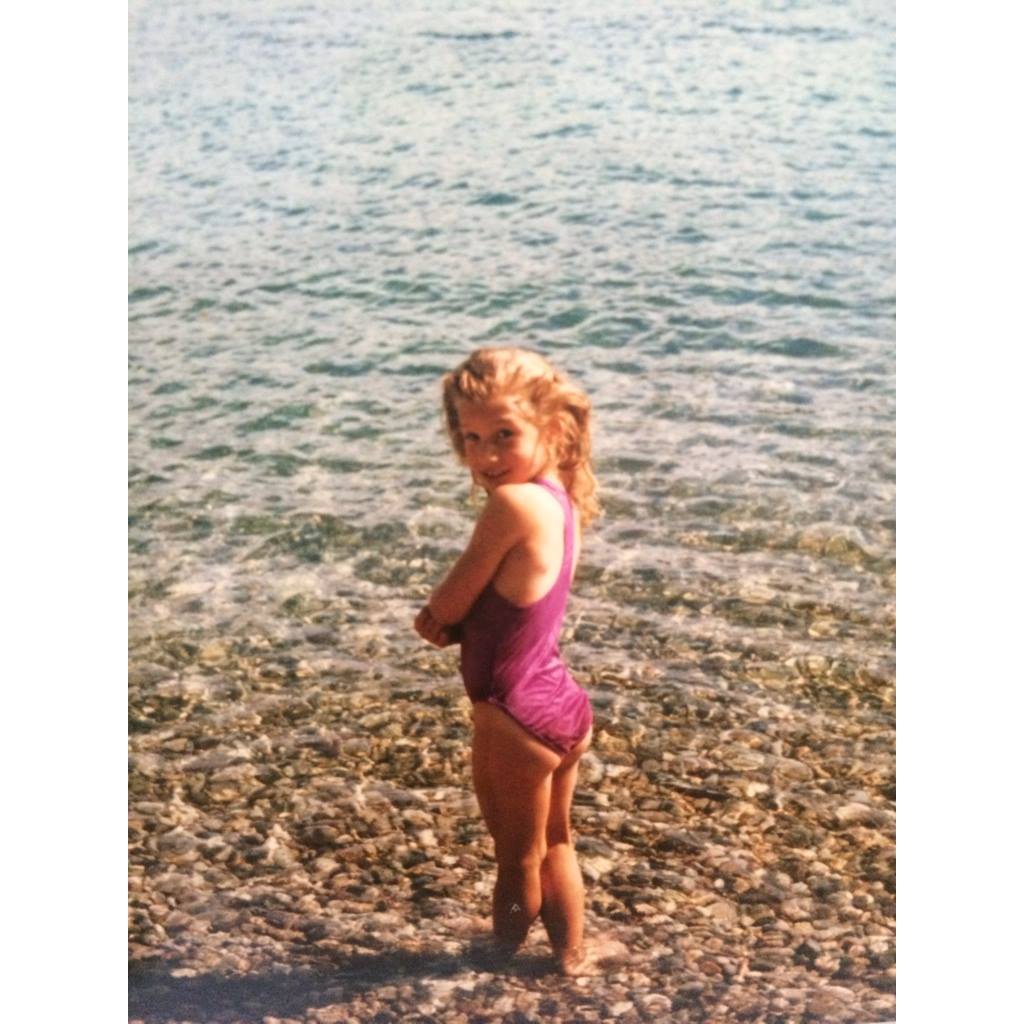
And all I remember about our day trip to Dubrovnik is serving this look on Stradun.
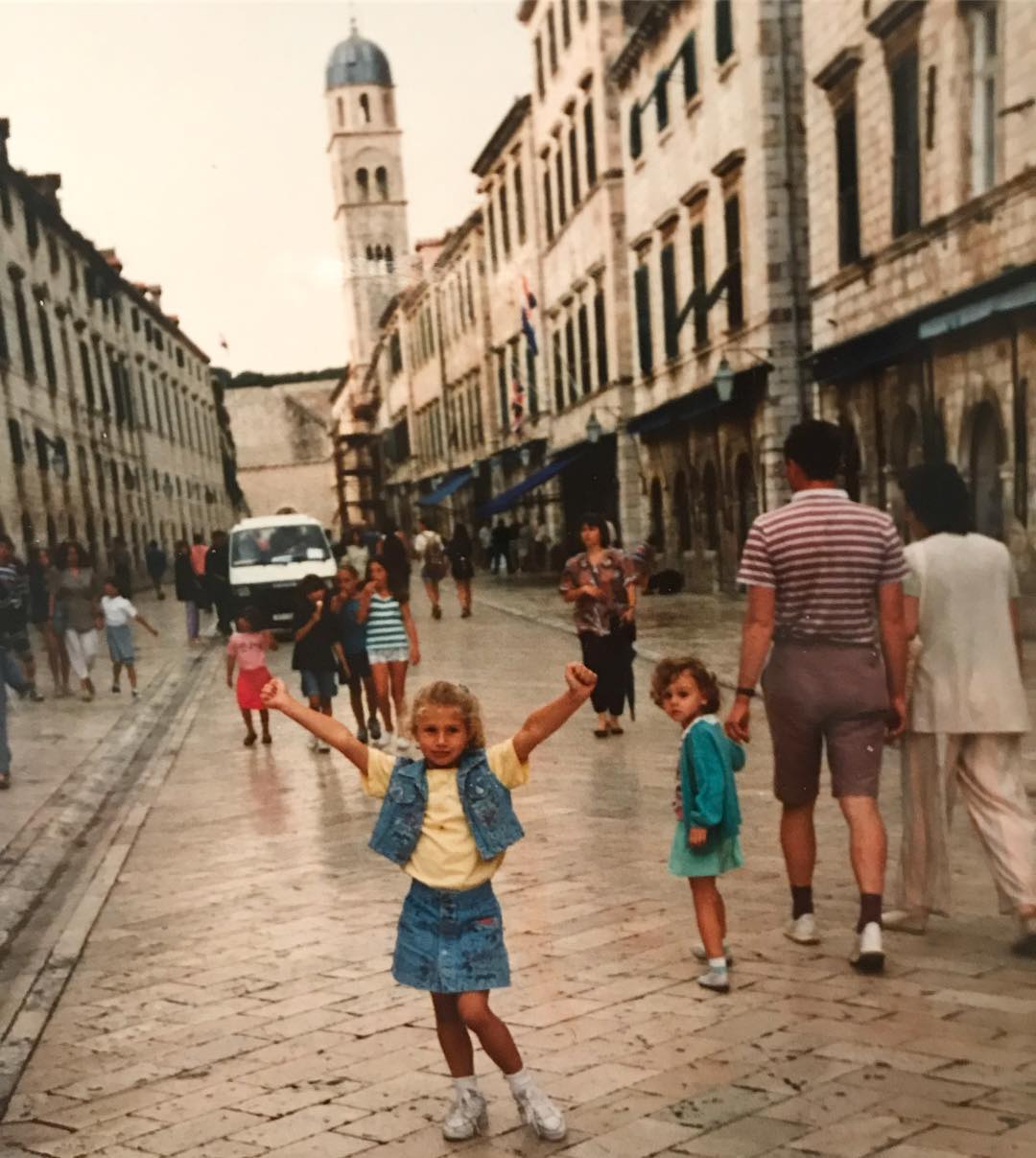
For more, make sure to check out our dedicated lifestyle section.
Hajduk and Villarreal to Meet in Europa Conference League Play-off!
August 10, 2022 - Hajduk and Villarreal will meet in the Europa Conference League play-off! Hajduk advanced past Vitoria in the 3rd qualifying round with a 3:2 aggregate on Wednesday in Portugal.
Vitoria and Hajduk met in the second leg of the Conference League 3rd-round qualifiers. Several thousand members of Hajduk fan group Torcida were in attendance.
Hajduk came to Dom Afonso Henriques stadium with a two-goal advantage after defeating Vitoria 3:1 in the first match at Poljud. Recall, the away goal rule is no longer in force.
"We have a plan that we want to implement. We have to have the same approach as in the home game. I am sure that Vitoria will play a different match than the one in Split; I believe that they are a better team than what they showed at Poljud," said coach Valdas Dambrauskas before the match.
Lineups
Vitoria Guimaraes: Varela, Miguel, Amaro, Mumin, Ogawa, Andre Almeida, Pains, Tiago Silva, Lameiras, Anderson, Antonin
Hajduk: Kalinić, Mikanović, Simić, Elez, Melnjak, Vuković, Grgić, Krovinović, Sahiti, Livaja, Čolina
Live match report
Vitoria had a dangerous free kick just outside the box in the 2nd minute, which was cleared by the Hajduk defense.
Just two minutes later, the worst-case scenario happened for Hajduk - Ogawa dribbled up the left wing and found Anderson alone at the top of the box. The Brazilian footballer brilliantly scored with his back to the goal, finding the upper right corner of Kalinic's goal for 1:0 in the 5th minute.
Hajduk had their first attack of the match in the 11th minute when Grgic flew up the left wing but crossed into the Vitoria defense.
Hajduk played nervously when in possession and could not connect more than a few passes at a time. Vitoria's pressure did not stop, and there were a few close calls in the next 10 minutes of play. Hajduk's defense was tested.
Hajduk continued playing unsuccessful long balls from the back, and by the 22nd minute, Vitoria had 8 attacks compared to Hajduk's 3.
Hajduk's best chance of the match came in the 23rd minute - Sahiti received the ball in the midfield and played a flawless ball through the Vitoria defense to Colina, who was one-on-one with the Vitoria keeper. Colina chipped the keeper and just went over the goal post.
Hajduk, at least, had stabilized their play. Much better than what we saw in the first part of the match.
Another chance for Hajduk came in the 26th minute. Krovinovic crossed to Colina whose header went over the goal.
Anderson tried to surprise Kalinic by shooting from 30 meters in the 30th minute, but the Hajduk keeper defended without any problems.
Another close call for Hajduk came a few minutes later in front of Kalinic's goal, but the ball luckily couldn't reach Anderson in the box.
Colina sent the ball into the box in the 38th minute, which was cleared by the Vitoria defense.
Hajduk had another chance in the 44th minute, but Sahiti was called offside. The match erupted into a mini brawl after the Vitoria keeper forcefully picked Sahiti up from the pitch. Vukovic ran over in Sahiti's defense, and Tiago Silva slapped Sahiti in the head, which the ref failed to see. There is no VAR in Conference League, and if there was, it could have easily been a red card for Silva. Instead, the ref gave Silva, Varela, and Vukovic yellow cards.
The match was 1:0 going into the half.
The second half started with one sub for Hajduk - Borevkovic came on for Simic, who has a yellow card.
Vitoria's first chance came in the 46th minute, which was cleared out for a Vitoria throw-in.
Vitoria had a free kick in the 52nd minute, which fortunately went out for a goal kick. One minute later, Jota nutmegged Hajduk's defense to find Anderson at the top of the box. His shot was blocked by Elez and went out for a corner.
Hajduk had a free kick in the 57th minute, which was cleared by the Vitoria defense, and the next play was a corner or Hajduk. Krovinovic crossed into the Vitoria keeper's hands.
Elez blocked Anderson's attempt a minute later, going out for a Vitoria corner, and was deflected out for another corner.
Colina was subbed off for Biuk in the 62nd minute.
Hajduk's best chance of the second half came in the 69th minute - Biuk crossed into the box from the left wing, which was a second too quick for Livaja.
Hajduk had a quick counter in the 70th minute after a few dangerous Vitorira attacks.
Jota shot near post in the 72nd minute.
Dambrauskas decided to play defensively from the 73rd minute, adding an extra stopper. Awaziem came on for Sahiti.
Good news for Hajduk came in the 78th minute - Tiago Silva was shown his second yellow card and sent off, forcing Vitoria to play with a man down for the remainder of the match.
Krovinovic shot at the keeper in the 83rd minute and Jota had a chance for Vitoria in the next play.
Mikanovic and Vukovic were subbed off for Lovrencsics and Atanasov in the 86th minute.
Biuk had a shot on goal in the 88th minute but hit near post and was ultimately called offside. Four minutes of stoppage time were added. Vitoria had a corner in the final seconds, but could not score.
Hajduk thus advanced to the Conference League play-off against Villarreal!
Post-match interview
Hajduk coach Valdas Dambrauskas said that they expected a tough game.
"We didn't have the control we wanted in the first half; the second half was better. We are happy that we passed, but I am not the happiest coach because of how we played, but I am happy that we passed," he said.
"We knew the match would be difficult. We have experienced players, but we don't have an experienced team. This group of players is playing together in Europe for the first time. Vitoria is a good, young team."
Villarreal is next
"This club has tradition, history, and great victories in the past. We don't go to Spain to take pictures with Villarreal players and post them on Instagram. Let's go there and compete; I believe we are not without chances.
Before that, Hajduk will face Dinamo.
"We are Hajduk; we are playing the biggest derby on Saturday. We have 23 players who are registered; I believe that every player will be looking forward to the next game. I think that now is a very good time to be a Hajduk player, first Dinamo, and then playing in Spain."
To follow the latest sports news in Croatia, follow TCN's dedicated page.
Foreign Ministry Condemns Indictment against Croat in Donetsk
ZAGREB, 10 August, 2022 - Croatia strongly condemns an indictment against Croatian national Vjekoslav Prebeg, who has been detained in the self-proclaimed republic of Donetsk, the Ministry of Foreign and European Affairs (MVEP) said on Wednesday.
Croatia "rejects the indictment and does not consider it to be legally sound because it is contrary to international law and conventions on the treatment of captured civilians and prisoners of war," the MVEP said in a press release.
The Ministry and competent services are in constant contact with the Ukrainian authorities and other partners in order to shed light on the case and have Prebeg released, the ministry said, adding that it has been in touch with the detainee's family.
According to Croatian media, Prebeg was arrested in May near Mariupol. He is accused of terrorist training, participation in the conflict as a mercenary, coup and subversion of the constitution.
Health Minister Claims there are Sufficient Quantities of COVID-19 Drug
ZAGREB, 10 August, 2022 - Health Minister Vili Beroš on Wednesday denied the claim by the Croatian Association of Hospital Doctors (HUBOL) that Croatian hospitals are running out of a drug used to treat COVID-19 patients, saying that hospitals have sufficient quantities of Remdesivir.
The claims by some health workers and medical associations about the shortage of Remdesivir in Croatian hospitals are not true, the health minister said in a statement.
HUBOL said on Wednesday that Croatian hospitals currently have only 483 doses of Remdesivir at their disposal, which is enough to treat only 80 COVID-19 patients, while 613 are being treated in hospitals.
Beroš said that Remdesivir is not applied to all hospitalised COVID-19 patients and that the present supplies are sufficient to meet the hospitals' needs.
Currently, 613 people are being treated for COVID-19 in 37 hospitals in Croatia, but only 39 of them are in intensive care units.
Beroš noted that Remdesivir, as well as other drugs used in the treatment of COVID-19 patients, is not intended for wide use, but is used only for a targeted group of hospitalised patients in line with special criteria. He added that the hospitals that lack Remdesivir can meet their needs by ordering it from the hospitals that have it in sufficient quantities, as has been the case during the pandemic.
The Health Ministry said it has launched the procedure to order more quantities of Remdesivir for Croatian hospitals via the integrated EU procurement system.
Petrinja Bridge Renamed in Honour of Volunteers who Helped 2020 Earthquake Victims
ZAGREB, 10 August, 2022 - A plaque was unveiled on a bridge in Petrinja on Wednesday naming it the Volunteers' Bridge in honour of the people who came to Petrinja in 2020 to help local residents deal with the aftermath of a 6.4 magnitude earthquake that hit the city on 29 December 2020.
The new name of the bridge over the River Petrinjčica was proposed by the Petrinja Spring civic group who in that way wanted to express their gratitude to all volunteers from Croatia and abroad who came to Petrinja immediately after the earthquake.
The head of the local fire brigade, Zvonimir Ljubičić, said that the bridge's new name was a token of gratitude to members of sport fans' groups, the Croatian Mountain Rescue Service (HGSS), Red Cross, firefighters and numerous individuals who spontaneously joined in efforts to help the earthquake victims.
"I think that people from all over the country came here. We cannot forget their help. They did not only repair damaged properties... they helped us heal our mental wounds, they cried with us. We had to tell them 'Thank you'," said Drinka Mažić of the Petrinja Spring.
The new name of the bridge was unveiled on the occasion of the day of the town's patron saint, St. Lawrence.
Seven people were killed and extensive material damage was caused in the areas of Petrinja, Sisak and Glina by the 29 December 2020 earthquake.
Sinj Time Machine: Let's Go Back to 1715 When it All Began!
August 10, 2022 - The Sinj Tourist Board is bringing it back to when it all began. Jump in the Sinj time machine and enjoy the annual reenactment of the Battle of Sinj 1715!
Organized by the Sinj Tourist Board, a reenactment of the famous and artistically immortalized Battle of Sinj 1715 will take place, along with the events that preceded it, on August 11 (Thursday) at 20:30 at Trg Kralja Tomislava (Market). The event will celebrate its 16th edition this year.
The historical spectacle takes place in two acts. The first act is staged at Pijaca, Sinj's main square, when the Ottomans dramatically and violently attacked and conquered the town of Sinj, burned the church, and took the people into slavery. Incredibly realistic light and sound effects contribute to the authenticity of the scenes. The second act takes place in the original setting of Alkarski dvori, the former Apartments. Despite the almost hopeless situation, the Defense Council does not think twice and defends its city against a more numerous, superior, and powerful enemy. According to tradition, it was with Our Lady's help that the Ottomans were defeated, and Sinj was freed from the threat of the enemy to keep Christianity. Led by Fr. Pavlo Vučković (embodied by the high school professor, scientist, writer, editor, and publisher Fr. Gabrijel Hrvatin Jurišić), the joyful and grateful faithful have celebrated their patron saint ever since with even greater fervor.

Ivana Pavicic
The Sinj time machine - let's go back together to 1715 when it all began!

Nikola Belančić
The director of the dramatic spectacle is Velimir Borković. The performance was brought to life in cooperation with the Shrine of the Miraculous Lady of Sinj and the Alka Knights Society. Numerous actors from amateur theaters participate in the event, and the leading roles include: Gabrijel Jurišić, Marko Duvnjak, Bruno Barać, Marijan Grbavac, Damir Žane Alebić, Saša Miletić, Bobo Delonga, Dijana Ivić Kundid, Bože Pavić, Vedrana Vrgoč, Sanja Gojun, Mirjana Živalj, Anđelka Vučković, Marko Jelinčić, Anđelka Vučković, Dino Vuković, Dubravka Vuković, Marija Mandac, Dušan Roguljić, Tihana Jelić, members of KU Marko Marulić, GZ Brodosplit, the historical units of the Klis Uskoks, the Patriot Defense Association, the Croatian Mountain Rescue Service, the "Gromovi Zagorje" mountain rescuers, the Association for the Preservation of the Heritage of the Cetinje Region, the Association of Rera and Guslar from Otok, the Sinjski Ferals, the horsemen of the Alka Knights Society, the Alka horses; Marko Vuković and Andrija Ribičić ride the carriages, Vesna Bader and Branka Marinović take care of the scenography, and Miki Nopling, who this year is preparing a particularly impressive staging, is responsible for the sound backdrop and special effects.

Željko Zrnčić
The director is the prominent theater, television, and film actor Robert Kurbaša, the assistant director is Bruno Barać, and the playwright and producer is Luka Perković. And this year, with the performance of the cantata of Our Lady of Sinj, the City Choir of Brodosplit is also in attendance, performing under the direction of maestro Vlada Sunko, a famous music pedagogue, conductor, and composer.
The Battle of Sinj 1715 is a unique stage spectacle under Sinj's August Nights, and the whole town becomes a stage that, with its originality, instantly transports the audience 307 years into the past! The performance is held with the support of the City of Sinj and the Split-Dalmatia County Tourist Board.
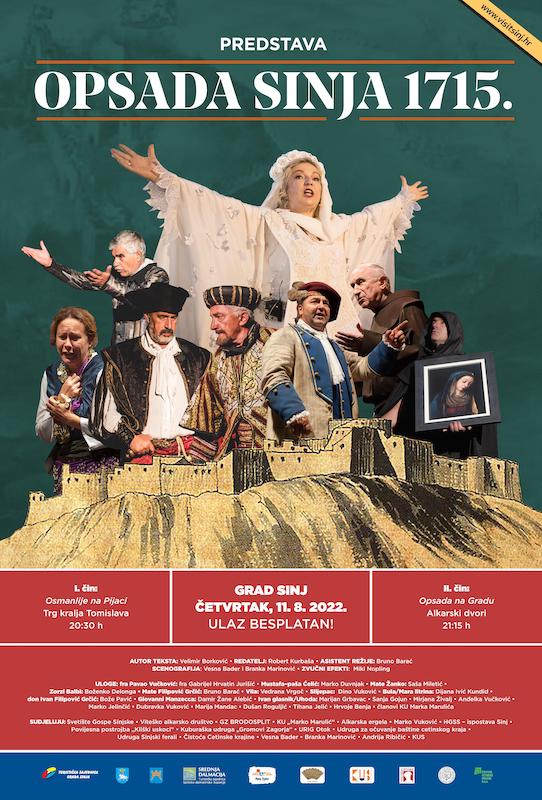
For more, make sure to check out our dedicated lifestyle section.
12th Sinj Village Fair Successfully Held Over Alka Weekend (PHOTOS)
August 10, 2022 - The 12th Sinj Village Fair was successfully held over Alka weekend and organized by the Sinj Tourist Board.
The 12th Sinj Village Fair was successfully held on Dr. Franje Tuđman Square from August 5 to 6, organized by the Sinj Tourist Board, with the support of the City of Sinj and the Cetinje Region LAG - through the 'Dinara back to life' project (LIFE18NAT/HR/000847).
It was attended by more than 25 exhibitors from the Cetina region, Kaštela, Marina, Split, Vrgorac, and Zagorje, who presented their products, from ornaments and handicrafts to gourmet delicacies and products from the village and islands. Old local crafts were also offered, such as the production of folk costumes, opanaks, bakeware, copper, garden tools and other traditional wooden handicrafts and collectibles.
The fair was opened by Miro Bulj, the mayor of Sinj, and all the visitors and participants were blessed by Fr. Marinko Vukman, guardian and director of the Church of Our Lady of Sinj.
In the entertainment part of the program, the Sinj majorettes enhanced the atmosphere as they do with every event. Visitors followed the performances of the faithful guardians of local traditions and customs through the songs and dances of Dalmatian Zagora, which are on the list of the intangible cultural heritage of the Republic of Croatia. This included the Association for Preserving Cetina Region Heritage, KUD Vrilo - Obrovac Sinjski, URIG from Otok, KUD Krenica - Gala, KUD Cetina, KUD Glavice, and KUD Dicmo, who performed the traditional rera, the Sinj kola and the final Vrli kola from the opera 'Ero s onoga svijeta'.
Then, Goran Mikas, who presented the chants and musical instruments of Poljica, and the visiting cultural and artistic societies, such as the singing group "Krčevljani" Vitez (BiH), HKUD Sv. Ante Humac - Ljubuški (BiH), KUD "Ilinden" from Demir Hisar (North Macedonia), who introduced us to the traditions and customs of their region. On the final night of the fair, Ljuta kuća performed to raise the atmosphere.
Visitors also took part in engaging educational workshops. Thus, they had the opportunity to get acquainted with the traditional pottery from Potravlje through the production of clay dishes under the skillful hands of master Ivan Knezović. This traditional craft was nominated for UNESCO protection by the Ministry of Culture. The Tourist Board, under the auspices of the Ministry, organizes well-attended educational workshops every year. Visitors could learn about the forgotten skill of making opanak shoes, the only footwear known to Sinj's ancestors and which served them faithfully and for a long time in all activities, as well as the art of weaving baskets at Ljilje Vojković's workshop.
Art & wine by Ana Poljak presented excellent works of art and wine from OPG Mažurin, along with a wool spinning workshop presented by Jasna and Domina Bilač, members of the Lipota Association. The fair also featured an exhibition of student works from the Split School of Crafts on "Women in Alka" and participants of last year's Sinj photo workshop "The World in Colors."
All visitors to the fair could take part in all the workshops for free and taste local gastronomic delicacies: Sinj uštipak prepared by the members of the Old Crafts Association as well as Sinj gingerbread prepared by Ankica Župić according to the original Sinj recipe.
The 12th Sinj village fair was led by prof. Branimir Romac.
"We would like to thank everyone who helped us bring this fair to life, especially: the City of Sinj and the LAG of Cetinje krajina - Dinara back to life (LIFE18NAT/HR/000847), the Alka Knights Society, the Shrine of the Miraculous Lady of Sinj, the employees of Cistoca in the Cetinje region, KUS-Sinj, Sinj majorettes, Srma association, exhibitors, Cultural and artistic societies, Kamičak d.d., Sinj bobi, MUP PP Sinj, HEP – Sinj, Elektro Bekan, Branki Marinović, and Maja Kovačević.
For more, make sure to check out our dedicated lifestyle section.
Number of Serbian Tourists in Croatia Highest Ever
ZAGREB, 10 August, 2022 - The number of Serbian nationals vacationing in Croatia is 60% higher than in the same period of 2021 and 20% higher than in the record year 2019, Večernji List daily said on Wednesday.
Croatia-Serbia tourism relations could be said to have normalised in recent years, but things get stirred up slightly every year in August, when Croatia commemorates the 1995 military operation "Storm", on which the two countries have diametrically opposed positions, and when embittered comments are made.
Operation Storm was a Croatian joint military and police operation that ended a Serb armed rebellion on 5 August 1995, and restored Croatian sovereignty over occupied central and southern parts of the country. It also resulted in a mass exodus of Croatian Serbs.
This year, a resentful comment was made by the mayor of Novi Sad, Miloš Vučević, who said that he did not want to condemn anyone but that he would never be able to understand Serbs vacationing in Croatia on 5 August.
This year, on that day, around 13,500 Serbian nationals were vacationing in Croatia, and none of them reported having any problems over their nationality, just like 127,000 Serbian nationals who have visited Croatia since the start of 2022.
The number of Serbian nationals vacationing in Croatia is 60% higher than in the same period of 2021 and as much as 20% higher than in 2019, the year with record-high tourism results.
The good results are also owing to activities by the Croatian Tourism Board (HTZ) and local HTZ offices. Even though Serbia is not a priority market for Croatia, a study tour was organised for a crew of the Serbian public broadcaster RTS's SAT programme, which has an audience of close to one million.
"Guests from Serbia and not different from visitors from other European countries. They change destinations, explore and visit depending on their interests and budget, and their hosts in Croatia treat them the same way they treat other guests. Our tourism workers do not care about politics or their guests' nationality, and the issue of the safety of Serbian visitors stopped being a topic some seven-eight years ago. I'm not saying that some of the Serbian guests have not experienced an unpleasant situation, a car break-in or something like that, but the same thing happens to German or Italian visitors," says Boris Žgomba, head of the Croatian Chamber of Commerce (HGK) association of travel agencies and director of the Uniline tourism company, which has an office also in Serbia.
This year his agency has seen a year-on-year increase in interest in the Serbian market in vacations in Croatia, and over the past few years, Serbian visitors' interest in Croatia has spread from destinations in the regions of Istria and Kvarner to Dalmatia, says the daily.
Croatia Logs 1,872 New COVID-19 Cases, 12 Related Deaths
ZAGREB, 10 August, 2022 - Croatia has registered 1,872 new COVID cases and 12 related deaths in the past 24 hours, the national COVID response team reported on Wednesday.
Currently, there are 7,710 active cases in the country, including 607 hospitalised patients, 22 of whom are on ventilators, while 3,591 people are self-isolating.
Since the beginning of the pandemic, a total of 1,196,221 COVID cases have been recorded in Croatia; 16,446 patients have died as a consequence and 1,172,065 have recovered, including 344 in the past 24 hours.
To date, 59.58% of the total population, or 70.85% of adults, have been vaccinated.
Is the Aleppo Pine to Blame for So Many Fires in Croatia?
August 10, 2022 - Almost every year we ask ourselves and the experts how come the number of wildfires in Croatia is increasing; is it just global warming or could the Aleppo pine be partially to blame?
The Croatian radiotelevision brings an interesting story, covered by many other media in Croatia, on what might be the causes for the increased number and size of the fires each summer. Their story starts by telling what happened to Dražen Ševerdija, one land owner in the Vodice hinterland, who lost more than 1,300 vines in one location alone, plus numerous figs and olive trees in the fire that recently savaged his estate. The firefighters defended the houses, and the ones they weren't able to save were near the areas where the Aleppo pine fires broke out. It was impossible to save those.
A retired agronomist Davorin Pamić has been warning about the dangers of the Aleppo pines in Dalmatia for years. He is certain that the cause of the increasingly frequent fires in Dalmatia is the Aleppo pine. It was even planted by foresters under the motto that it, its roots, will keep the land and erosion will not occur. However, they seem to have overlooked some of its other negative aspects, which is that it is very easily flammable. It's full of resin. And its cone, when it catches fire, can fly 50-60 meters like a bullet, and catch fire there, he says.
The flaming cone is what caused a fire in Milivoje Ševerdija's barn when it flew in. The hay was set on fire and part of the herd was killed. The people still living off the farms in Dalmatia are also struggling to get any type of compensation for the damages done by the wildfires, as the bureaucracy is horrible and the compensations themselves end up being symbolic. All of that leads to fewer people continuing to work on the land after every fire.
Pamić brings some numbers to the table: In 1960, Dalmatia had a million sheep. And then when a fire broke out, 2.7 hectares would burn. In 1998, Dalmatia had only 200,000 sheep, but then 47 hectares burned in one fire. This means that we have five times less livestock, and 20 times more land is burning (note by the author: the numbers are certainly even worse 25 years later). And it will continue to be like that because there is no real prevention: no grazing, no people to look after the neglected surfaces.
The head Croatian fire chief said that, like Italy, we will have to introduce a tax on uncultivated land. And that's fine. However, he does not know that 80 percent of the agricultural area in Dalmatia has an extremely unorganized ownership situation, such as it was when Austria-Hungary dissolved. Pamić says that his olive grove was last registered in the books in 1910, 1/22 of it, more than 100 years ago. Who will now, in 2022, get the tax slip or be held accountable?
The same questions have been asked for decades. The same answers always seem to appear, without application in practice. The only thing that changes is the weather - and for the worse, extreme droughts, extreme fires... the future will certainly bring more of them. Will we continue to welcome them unprepared?


